
Arizona Public Policy - Solar and Renewable Energy |
|
 |
For approximately seven years, the Arizona Solar Energy Industries Association (ARISEIA) and the Concerned Arizonans for Renewable Energy (CARE) have been actively working on legislation that creates positive public policy promoting greater use of solar and renewable energy in Arizona. |
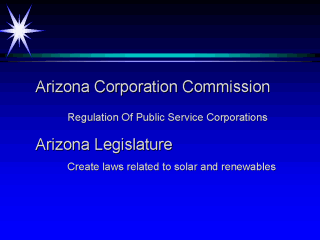 |
Two public bodies in the state of Arizona have the authority to approve measures that support good public policy related to solar and renewable energy in the state of Arizona:
|
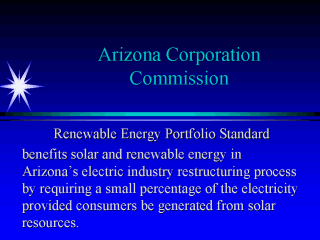 |
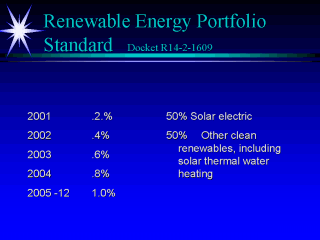
|
|
The Arizona Corporation Commission recently adopted a Renewable Energy Portfolio Standard which benefits solar and renewable energy in Arizona’s electric industry restructuring process by requiring a small percentage of the electricity provided consumers be generated from solar resources. |
|
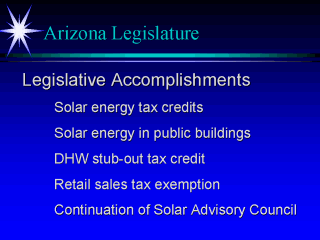 |
|
|
In recent years, a bipartisan effort so pass legislation supportive of solar and renewable energy has been successful in the passage of the following measures: Solar energy tax credits The tax credit allows a direct credit of 25% of the cost of the system with a $1000 maximum. The credit may be carried forward for a period of five years. Solar energy in public buildings This bill requires the state of Arizona to use any solar or renewable energy application, including passive design, that has a direct pay back of seven years or less when remodeling or building state buildings. DHW stub-out tax credit Allows home builders a credit of $75 to "stub out", or install, transport lines for solar water heating systems and/or a 220V electrical line to be used for electric vehicle recharging. Retail sales tax exemption Extended a sales tax exemption for solar retail companies. Continuation of Solar Advisory Council Extended the life of the Solar Advisory Council, a body of solar experts that advises the Arizona Department of Commerce, Energy Office in matters related to solar and renewable energy. Contractors sales tax exemption Included solar contractors in the exemption of solar taxes for solar systems. Energy efficient homes tax deduction Created a income tax deduction for the building of energy efficient homes. The top ten percent of energy efficient homes in a given year will qualify for a $5000 income tax deduction. Utility Tax Valuation Equalizes the property taxes paid by utilities on solar and renewable energy power plants with that of a traditional power plant. |
|
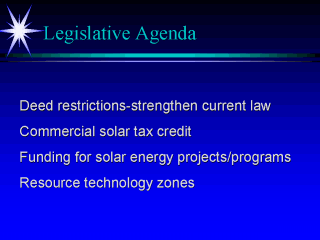 |
2001 Legislative agenda Deed restrictions/CC&R’s-strengthen current law One of the major barriers to the installation of residential solar thermal and PV systems in Arizona’s metropolitan areas are restrictions placed on rooftop solar installations by builders and developers in the Conditions, Covenants and Restrictions (CC&R’s) that are placed on homes in planned communities. Arizona’s Legislature passed a law in 1979 prohibiting such restrictions, but the law is largely ignored by developers. |
|
Commercial solar tax credit In recent sessions, legislation has been introduced that would allow a commercial credit of 25% of the cost of a solar system with a $5000 maximum. Funding for solar energy projects/programs In order to increase promotion of solar and renewable energy to the public and to promote Arizona as prime location for solar and renewable energy companies, legislation has been introduce to provide the Arizona Department of Commerce, Energy Office with $300,000 a year for a two year period. |
|
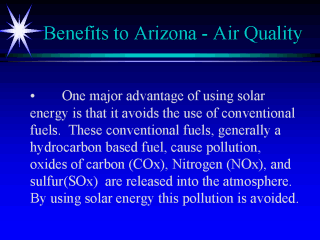 |
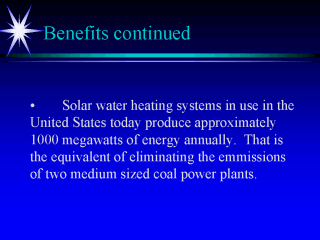
|
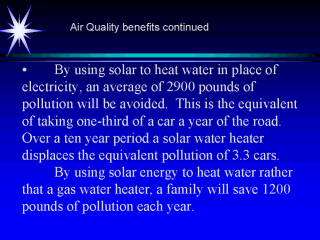 |
|
|
SOLAR ENERGY AIR QUALITY BENEFITS TO ARIZONA Over 1.5 million Americans have invested in solar, mostly hot water systems for their homes and businesses. Surveys taken over the last ten years confirm that the vast majority of owners (94% or more) consider that investment a wise decision. Enough energy falls on every Arizona household every day to more than meet the energy needs of that house. Developing that resource would benefit Arizona both economically and environmentally. The opportunity exists to develop that resource and make Arizona a leader in solar technology. AIR QUALITY BENEFITS
|
|
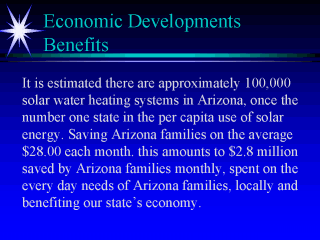 |
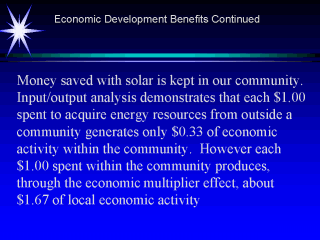
|
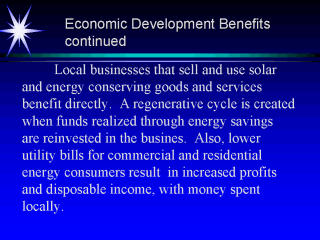 |
|
|
ECONOMIC BENEFITS
|
|
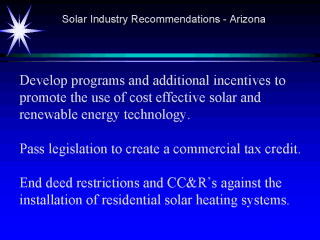 |
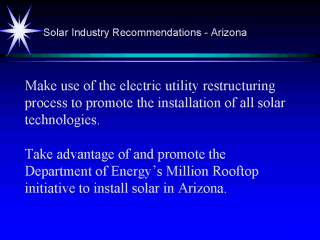
|
|
These are recommendations for Arizona's solar industry:
|
|